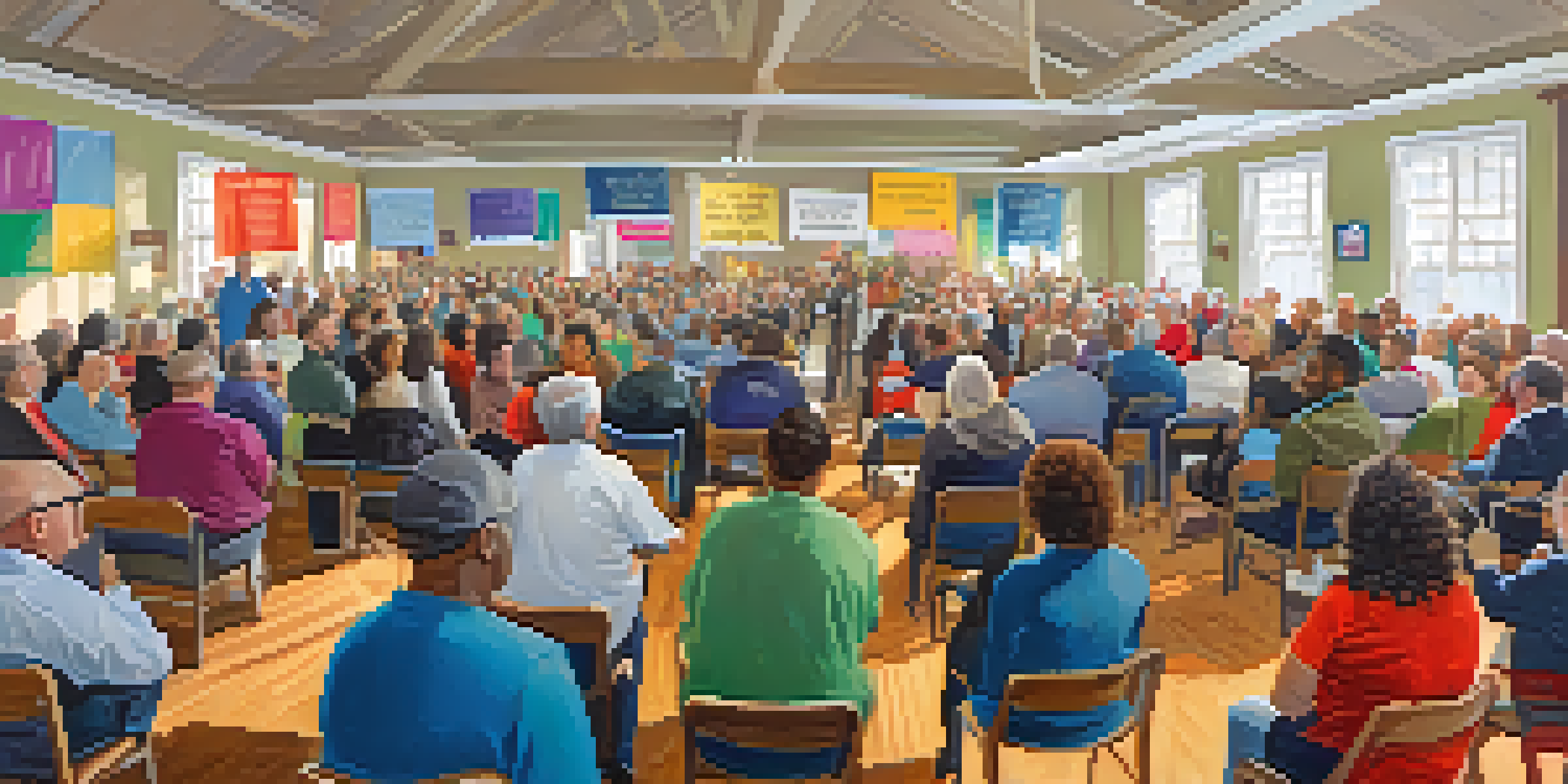The Impact of Local Governments on New Jersey Politics

Understanding the Structure of Local Governments in NJ
New Jersey has a unique and complex system of local governments, including municipalities, counties, and school districts. Each of these entities plays a critical role in governance, affecting residents' daily lives. With over 560 municipalities, local governance can vary significantly from one area to another, influencing everything from tax rates to public services.
The best way to predict the future is to create it.
The structure allows for a high degree of local autonomy, meaning that decisions are often made close to the communities they affect. This local focus can lead to more responsive governance, as officials are more in tune with the needs and desires of their constituents. However, this fragmentation can also create challenges, such as uneven service delivery and political inconsistencies across the state.
Understanding this structure is essential for grasping how local governments shape broader political dynamics in New Jersey. Their influence extends beyond local issues, as they often serve as a training ground for future state and federal leaders, impacting the political landscape at every level.
Local Elections: The Bedrock of New Jersey Politics
Local elections in New Jersey can often overshadow state and national contests, serving as a crucial barometer of political sentiment. Voter turnout in these elections tends to be lower, yet they have a significant impact on the political landscape, shaping party dynamics and candidate viability. This is where grassroots movements often gain traction, influencing broader political agendas.

For instance, a local mayor’s race can signal rising issues that may eventually reach the state level, such as affordable housing or public safety concerns. Candidates often start their political careers in local races, gaining experience and visibility that can propel them to higher offices. This pathway underscores the importance of local elections in fostering civic engagement and political participation.
Local Governments Shape Daily Life
New Jersey's complex local government structure allows municipalities to directly influence residents' daily experiences and governance.
Moreover, local elections allow for a diverse array of voices and perspectives, which enriches the political dialogue in New Jersey. As communities grapple with their unique challenges, local leaders often emerge as advocates for change, setting the stage for future political developments.
The Role of Local Officials in Policy Making
Local officials, such as mayors and council members, wield considerable power in shaping policies that directly impact their communities. They often have the authority to make decisions on zoning, public health, and education funding, which can resonate far beyond their municipalities. This localized decision-making allows for tailored solutions to specific community needs.
Local government is where the rubber meets the road, where the policies and programs we create affect the lives of our citizens every day.
Additionally, these officials often collaborate with state lawmakers, providing a crucial link between local issues and state-level policies. They may advocate for funding or legislative changes that reflect their constituents' priorities, ensuring that local voices are heard in the statehouse. This dynamic illustrates how local governance can influence broader political trends and state policies.
However, the effectiveness of local officials can vary widely, depending on factors such as political will, resources, and community engagement. In some cases, local leaders may face challenges in implementing their policies due to opposition from state officials or other stakeholders, highlighting the complex interplay between different levels of government.
Community Engagement and Local Government
Community engagement is a cornerstone of effective local governance in New Jersey. When residents are actively involved in local decision-making processes, it fosters a sense of ownership and accountability. This engagement can take many forms, from public meetings to community workshops, encouraging diverse voices to contribute to local policies.
Moreover, local governments that prioritize transparency and communication often see higher levels of civic participation. This engagement can lead to more informed decisions that reflect the community's needs and aspirations. For example, initiatives like participatory budgeting empower residents to directly influence how public funds are allocated, creating a more democratic and inclusive process.
Local Elections Drive Political Change
Local elections serve as a critical indicator of political sentiment, often affecting broader state and national agendas.
However, challenges remain, particularly in ensuring that all community members have equal access to participate. Barriers such as language, socioeconomic status, or lack of awareness can hinder engagement efforts, making it essential for local governments to implement strategies that promote inclusivity and representation.
The Impact of Local Government on State Politics
Local governments in New Jersey not only address community-specific issues but also significantly influence state politics. Decisions made at the local level can ripple through to state policies, especially in areas such as education, transportation, and public health. For example, a local initiative to improve public transit can prompt state discussions on funding and infrastructure development.
Moreover, local leaders often become key players in state politics, advocating for their communities and pushing for legislative changes that align with local needs. This can create a powerful network of influence, where local issues gain visibility and traction at the state level. As local governments navigate their challenges, they can set precedents that shape statewide policies.
The interconnectedness of local and state politics underscores the importance of local governance in New Jersey. As communities evolve and face new challenges, the responses from local leaders can significantly impact the broader political landscape, highlighting the critical role of local governments in shaping state politics.
Challenges Facing Local Governments in New Jersey
Local governments in New Jersey face a myriad of challenges that can hinder their effectiveness and influence. Issues such as budget constraints, aging infrastructure, and population shifts can complicate local governance. For instance, municipalities may struggle with funding essential services due to limited revenue sources, leading to tough decisions about prioritizing needs.
Additionally, political polarization can create obstacles for local governments, particularly when communities are divided on key issues. This polarization can stymie collaboration and compromise, making it difficult for local officials to implement effective policies. As communities grapple with these divisions, finding common ground becomes increasingly essential for effective governance.
Community Engagement Is Crucial
Active community participation in local governance fosters accountability and ensures decisions reflect residents' needs.
Moreover, the ongoing impacts of the COVID-19 pandemic have exacerbated many of these challenges, highlighting the need for adaptive strategies and resilience in local governance. Communities must navigate new realities, such as shifting health priorities and economic recovery, all while maintaining the trust and engagement of their residents.
The Future of Local Governance in New Jersey
As New Jersey continues to evolve, the future of local governance will likely be shaped by emerging trends and challenges. The increasing importance of technology in governance presents both opportunities and hurdles for local officials. From digital engagement tools to data-driven decision-making, local governments can enhance transparency and responsiveness but must also address issues like digital equity.
Furthermore, climate change and sustainability will play a significant role in shaping local policies and initiatives. Communities are increasingly looking to their local governments to lead efforts in environmental stewardship and resilience planning. This shift reflects a growing awareness of the interconnectedness of local actions and global challenges.

Ultimately, the future of local governance in New Jersey will depend on how effectively local leaders engage their communities and adapt to changing circumstances. By fostering collaboration and innovation, local governments can continue to be a vital force in shaping the political landscape and addressing the needs of their residents.